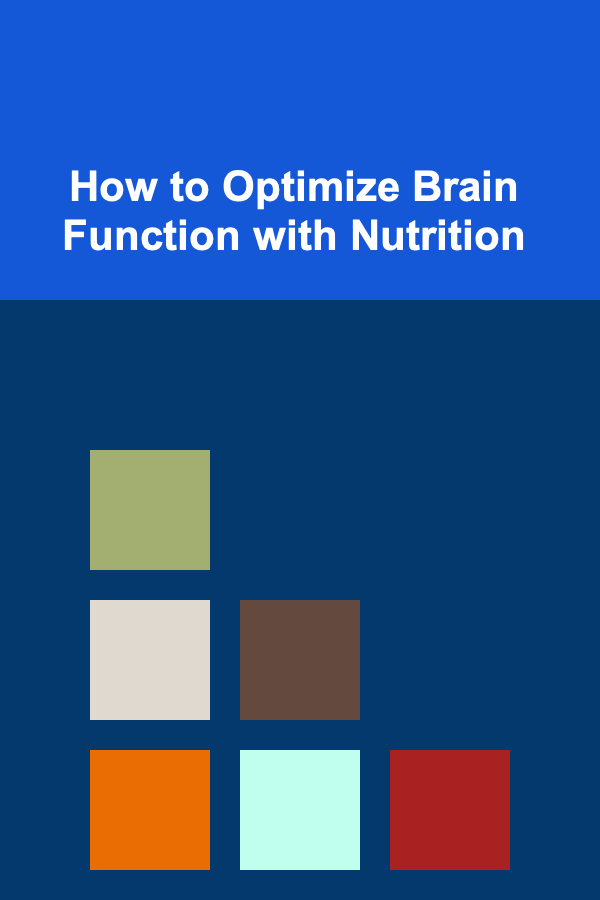
How to Optimize Brain Function with Nutrition
ebook include PDF & Audio bundle (Micro Guide)
$12.99$11.99
Limited Time Offer! Order within the next:

The human brain is an incredibly complex and powerful organ, responsible for controlling every aspect of our thoughts, actions, emotions, and physiological processes. However, maintaining optimal brain function is not just about mental exercises, sleep, and stress management---it is also deeply linked to the food we eat. Nutrition plays a pivotal role in brain health and cognitive performance, influencing everything from memory and focus to mood and mental clarity. Given the growing interest in cognitive health, understanding the relationship between nutrition and brain function has never been more crucial.
In this article, we'll explore how to optimize brain function with nutrition by examining the key nutrients that support cognitive health, identifying foods that promote mental performance, and discussing the best dietary strategies to keep your brain in top shape throughout life. From essential vitamins and minerals to omega-3 fatty acids and antioxidants, we will break down the science of how what you eat can help your brain thrive.
Understanding the Brain's Nutritional Needs
To begin, it's important to understand that the brain is a highly energy-demanding organ, despite constituting only about 2% of your body weight. It uses roughly 20% of your total energy intake, which means that the fuel you provide it significantly impacts its performance. Just as your muscles need the right balance of nutrients for strength and endurance, your brain requires specific nutrients to function at its peak.
The brain is composed of fat (particularly in the form of phospholipids), proteins, and water, which makes certain nutrients particularly essential for cognitive function. The nutrients you consume not only supply the energy required for the brain's various processes but also support brain cell communication, the creation of new neural connections, and the protection of the brain from oxidative stress and inflammation.
1.1 The Role of Glucose
The brain's primary source of energy is glucose, which comes from carbohydrates in food. When you consume carbohydrates, your body breaks them down into glucose, which then enters the bloodstream and is delivered to the brain. Low levels of glucose can lead to cognitive fatigue, difficulty concentrating, and even memory problems. This is why maintaining stable blood sugar levels throughout the day is critical for sustained mental performance.
However, not all carbohydrates are created equal. Complex carbohydrates, such as those found in whole grains, vegetables, and legumes, provide a steady, slow-releasing source of glucose, whereas simple sugars from processed foods can lead to spikes and crashes in blood sugar, affecting brain function negatively.
Essential Nutrients for Optimal Brain Health
Numerous studies have highlighted the importance of certain nutrients in maintaining cognitive function, enhancing memory, and protecting the brain from age-related decline. Here, we will delve into the most critical nutrients that should be included in a brain-boosting diet.
2.1 Omega-3 Fatty Acids
Omega-3 fatty acids are among the most vital nutrients for brain health. These essential fats, which include eicosapentaenoic acid (EPA) and docosahexaenoic acid (DHA), are key components of the brain's cell membranes. They play a role in cellular communication, neuronal signaling, and the regulation of inflammation. Studies have shown that omega-3s can help protect against cognitive decline, improve memory and focus, and reduce the risk of mental health disorders, such as depression and anxiety.
Sources of Omega-3s:
- Fatty fish such as salmon, mackerel, sardines, and trout
- Chia seeds
- Flaxseeds
- Walnuts
- Algal oil (a plant-based source of DHA)
2.2 Antioxidants
The brain is particularly vulnerable to oxidative stress, a process where free radicals damage brain cells, leading to cognitive decline. Antioxidants are compounds that help neutralize free radicals and protect the brain from this damage. Certain antioxidants, including flavonoids, vitamin C, and vitamin E, have been shown to reduce oxidative stress and support brain health.
Antioxidant-rich foods for brain health:
- Berries (blueberries, strawberries, raspberries)
- Dark chocolate (85% cocoa or higher)
- Spinach, kale, and other leafy greens
- Nuts (especially almonds and walnuts)
- Green tea
- Turmeric (which contains curcumin)
2.3 B-Vitamins
B-vitamins, including B1 (thiamine), B6 (pyridoxine), B12 (cobalamin), and folate, are crucial for brain health. They are involved in energy production, neurotransmitter synthesis, and the regulation of homocysteine levels, an amino acid linked to cognitive decline. B12 and folate deficiencies, for example, can lead to memory issues, mental fog, and even mood disorders like depression.
Foods rich in B-vitamins:
- Leafy greens (for folate)
- Whole grains, beans, and lentils (for B1, B6)
- Meat, poultry, and eggs (for B12)
- Fortified cereals (for B12 and folate)
2.4 Vitamin D
Vitamin D, often referred to as the "sunshine vitamin," is another important nutrient for cognitive function. It is thought to play a role in neuroprotection and the formation of new brain cells. Low levels of vitamin D have been associated with an increased risk of cognitive decline and mental health disorders like depression.
Sources of Vitamin D:
- Sunlight exposure (your body can produce vitamin D when exposed to the sun)
- Fatty fish (salmon, mackerel, sardines)
- Egg yolks
- Fortified foods (milk, orange juice, cereals)
2.5 Magnesium
Magnesium is a mineral that supports over 300 biochemical reactions in the body, including those involved in brain function. It plays a role in regulating neurotransmitter activity, promoting relaxation, and supporting healthy sleep. Magnesium deficiency has been linked to mood disorders, including anxiety and depression, and can contribute to cognitive decline over time.
Sources of Magnesium:
- Dark leafy greens (spinach, chard)
- Nuts and seeds (almonds, pumpkin seeds)
- Whole grains (brown rice, quinoa)
- Legumes (black beans, lentils)
2.6 Zinc
Zinc is an essential mineral involved in numerous brain processes, including neurotransmitter function, gene expression, and the maintenance of synaptic plasticity---the brain's ability to form new neural connections. Zinc is also known to support immune function, which is crucial for maintaining brain health.
Sources of Zinc:
- Oysters and shellfish
- Red meat and poultry
- Beans and lentils
- Pumpkin seeds
Foods to Incorporate for Brain-Boosting Nutrition
With the understanding of essential nutrients for brain health, it's time to turn our attention to specific foods that can optimize brain function. Incorporating these nutrient-dense foods into your daily diet can help improve mental performance, protect against age-related cognitive decline, and support emotional well-being.
3.1 Fatty Fish
As mentioned earlier, fatty fish like salmon, mackerel, and sardines are rich in omega-3 fatty acids, which are essential for brain health. These fish also contain vitamin D, which is important for cognitive function.
How to Incorporate Fatty Fish:
- Grilled salmon with lemon and herbs
- Sardines on whole-grain crackers
- Tuna salad made with olive oil and leafy greens
3.2 Blueberries
Blueberries are packed with antioxidants, particularly flavonoids, which help protect the brain from oxidative stress. Studies have shown that regular consumption of blueberries may improve memory and delay age-related cognitive decline.
How to Incorporate Blueberries:
- Add fresh blueberries to smoothies or oatmeal
- Use frozen blueberries in baked goods like muffins or pancakes
- Enjoy a handful as a snack with a sprinkle of almonds
3.3 Leafy Greens
Leafy greens such as spinach, kale, and swiss chard are rich in vitamins, minerals, and antioxidants that support brain health. They are also a great source of folate, which helps reduce levels of homocysteine, an amino acid linked to cognitive decline.
How to Incorporate Leafy Greens:
- Make a salad with spinach, arugula, and other greens
- Add greens to smoothies for a nutrient boost
- Stir-fry kale or chard with garlic and olive oil
3.4 Walnuts
Walnuts are rich in omega-3 fatty acids, antioxidants, and vitamin E, all of which promote brain health. Some studies suggest that walnuts may improve cognitive function and even protect against Alzheimer's disease.
How to Incorporate Walnuts:
- Add walnuts to salads, yogurt, or oatmeal
- Snack on raw walnuts with a piece of dark chocolate
- Incorporate walnuts into baked goods like cookies or bread
3.5 Dark Chocolate
Dark chocolate is a powerful source of antioxidants, particularly flavonoids, which can boost brain function and improve mood. Opt for chocolate with at least 70% cocoa to maximize its health benefits.
How to Incorporate Dark Chocolate:
- Enjoy a square of dark chocolate as a dessert or snack
- Melt dark chocolate to dip fruit or nuts
- Add dark chocolate to smoothies for a rich, indulgent flavor
Best Dietary Patterns for Brain Health
To optimize brain function, it's not just about adding specific foods to your diet---it's also about adopting a balanced, nutrient-dense dietary pattern that supports long-term brain health. Several dietary approaches have been shown to enhance cognitive function and protect against neurodegenerative diseases.
4.1 Mediterranean Diet
The Mediterranean diet emphasizes whole foods, including fruits, vegetables, whole grains, lean protein (especially fish), and healthy fats, particularly olive oil. Studies have consistently shown that the Mediterranean diet is associated with a reduced risk of cognitive decline and Alzheimer's disease. Its emphasis on anti-inflammatory and antioxidant-rich foods makes it an ideal choice for supporting brain health.
4.2 DASH Diet
The Dietary Approaches to Stop Hypertension (DASH) diet is designed to reduce high blood pressure and improve overall cardiovascular health, which in turn supports brain function. It focuses on consuming foods rich in potassium, magnesium, calcium, and fiber while limiting salt and processed foods.
4.3 Plant-Based Diets
Plant-based diets, which emphasize fruits, vegetables, whole grains, legumes, and nuts, are rich in antioxidants, fiber, and healthy fats, all of which promote cognitive health. While not everyone may choose a fully plant-based diet, reducing the intake of animal products in favor of plant-based options can have significant benefits for brain function.
Conclusion
Optimizing brain function with nutrition is not just about what you eat today---it's about creating long-term habits that promote brain health over time. By focusing on nutrient-dense, brain-boosting foods rich in omega-3s, antioxidants, vitamins, and minerals, you can enhance cognitive function, protect against mental decline, and improve your overall well-being. The choices you make in your diet today will have a lasting impact on your brain's performance, so it's essential to prioritize foods that nourish and protect this vital organ. By incorporating the right balance of nutrition into your daily life, you can keep your brain sharp, healthy, and functioning at its best for years to come.
Reading More From Our Other Websites
- [Personal Investment 101] How to Profit from Deep Learning Through SaaS Products
- [Home Budget 101] How to Save for a Vacation While Maintaining a Home Budget
- [Home Cleaning 101] How to Clean and Maintain Your Home's Baseboards and Trim
- [Organization Tip 101] How to Create a System for Managing Home Projects
- [Home Security 101] How to Secure Your Home's Wi-Fi Network Against Hackers
- [Organization Tip 101] How to Coordinate with Vendors Effectively
- [Home Party Planning 101] How to Host a Party Without Overwhelming Yourself
- [Home Holiday Decoration 101] How to Style Your Fireplace Mantel for Holiday Charm
- [Personal Care Tips 101] How to Choose a Hair Gel for Humid Weather
- [Toy Making Tip 101] How to Create Eco‑Conscious Toy Kits That Teach Kids About Sustainability

How to Organize Your Favorite Recipes for Quick Cooking
Read More
How to Reflect on Past Seasons to Improve Future Organization
Read More
How to Stage Your Home on a Budget: Affordable Tips
Read More
How to Use Deep Learning for E-commerce Profit and Passive Income
Read More
How To Explore Electric Off-Road Vehicles
Read More
How to Track Entertainment Expenses for Freelancers
Read MoreOther Products

How to Organize Your Favorite Recipes for Quick Cooking
Read More
How to Reflect on Past Seasons to Improve Future Organization
Read More
How to Stage Your Home on a Budget: Affordable Tips
Read More
How to Use Deep Learning for E-commerce Profit and Passive Income
Read More
How To Explore Electric Off-Road Vehicles
Read More